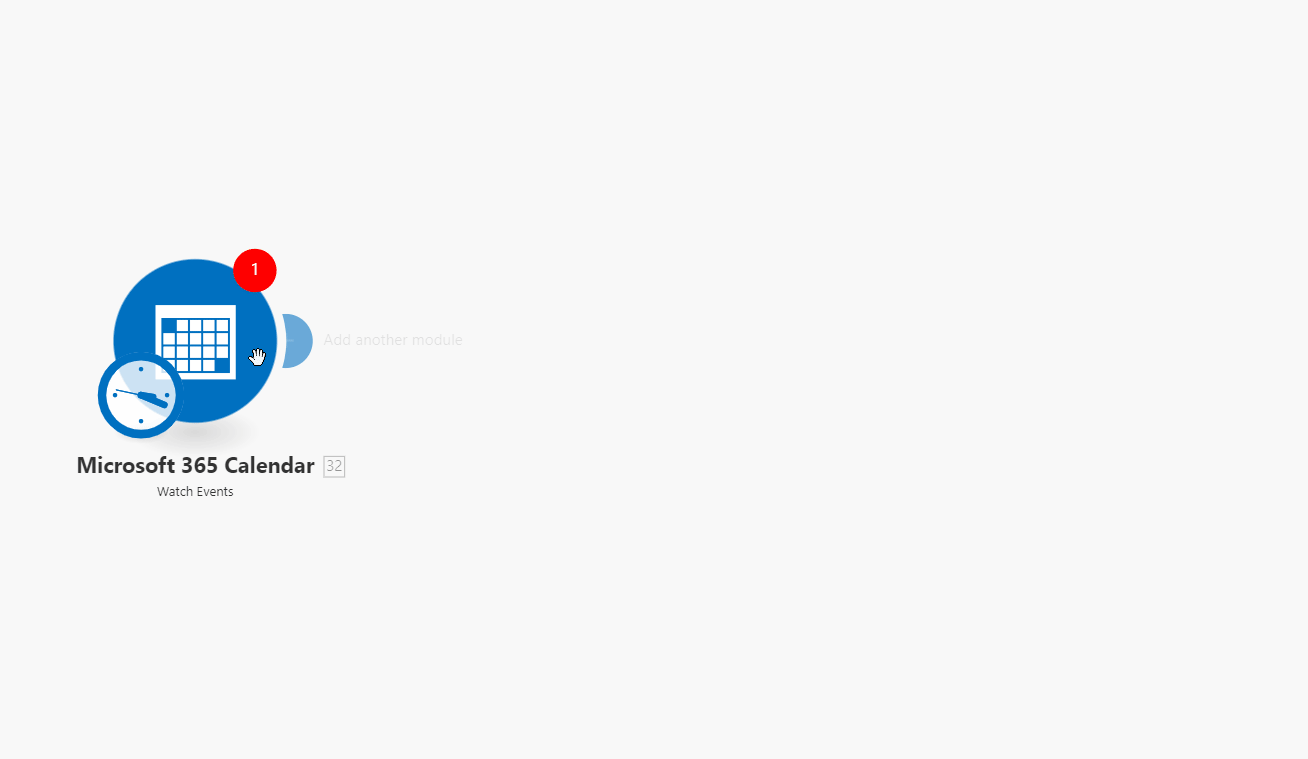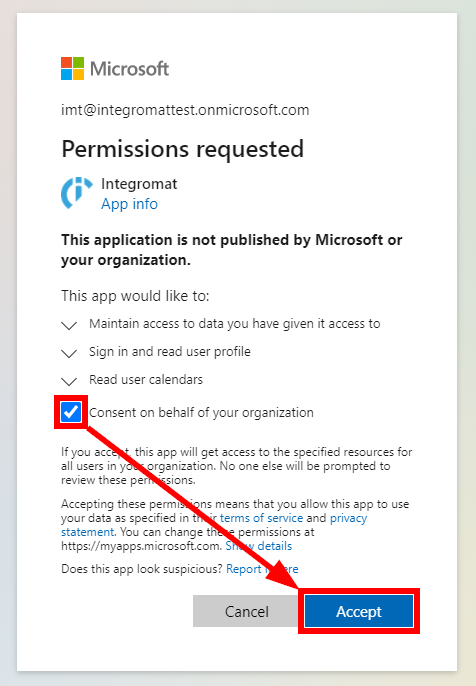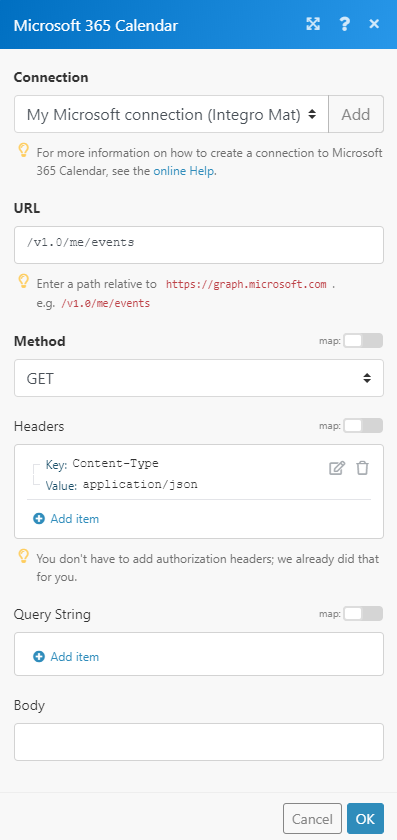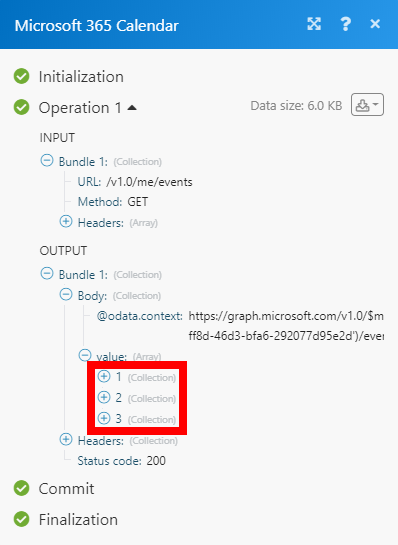Microsoft 365 Calendar
Version Latest
Here is the documentation for the legacy Microsoft 365 Calendar (legacy) app.
The Microsoft 365 Calendar modules allow you to monitor, create, update, or delete the events and calendars in your Microsoft 365 Calendar account.
Getting Started with Microsoft 365 Calendar
Prerequisites
- A Microsoft account
In order to use Microsoft 365 Calendar with Integromat, it is necessary to have a Microsoft 365 account. If you do not have one, you can create a Microsoft account at office.com.
Connecting Microsoft 365 Calendar to Integromat
1. Go to Integromat and open the Microsoft 365 Calendar module's Create a connection dialog.

2. Enter the name of the connection to the Connection name field and click Continue.
After you click the Continue button, Integromat will redirect you to the Microsoft website where you will be prompted to log in and grant Integromat access to your account.

Check the checkbox and confirm the dialog by clicking the Accept button.
Event
Watch Events
Retrieves event details when an existing event is modified or a new event is created.
| Connection | Establish a connection to Microsoft 365 Calendar. |
| Watch Events | Select whether you want to watch new or updated events. |
| Calendar Group ID | Select the calendar group that contains the calendar where you want to watch events at. |
| Calendar ID | Select the calendar you want to watch. |
| Filter | Set the filter conditions to filter results by subject, event ID, or body. |
| Limit | Set the maximum number of events Integromat will return during one execution cycle. |
Search Events
Retrieves events based on filter settings.
| Connection | Establish a connection to Microsoft 365 Calendar. |
| Calendar Group ID | Select the calendar group that contains the calendar you want to search for events. |
| Calendar ID | Select the calendar you want to search for events. |
| Filter | Set the filter conditions to filter searched events by subject, event ID, created date, last modified date, or body. |
| Order By | Select the sort order of returned events. |
| Limit | Set the maximum number of events Integromat will return during one execution cycle. |
Get an Event
Retrieves details of the specified event
| Connection | Establish a connection to Microsoft 365 Calendar. |
| Event ID | Enter (map) or select the event you want to retrieve details about. |
Create an Event
Creates a new event.
| Connection | Establish a connection to Microsoft 365 Calendar. | ||||
| Calendar ID | Select the calendar you want to create an event at or leave empty to create an event in your default calendar. | ||||
| Subject | Enter the event's title. | ||||
| Start Date | Enter a single point of time when the event starts in a combined date and time representation ({date}T{time}; for example, 2017-08-29T04:00:00.0000000). The list of supported date and time formats. | ||||
| End Date | Enter a single point of time when the event ends in a combined date and time representation ({date}T{time}; for example, 2017-08-29T04:00:00.0000000). The list of supported date and time formats. | ||||
| Reminder On | Enable this option to specify the reminder settings. | ||||
| Reminder | The number of minutes before the event start time that the reminder alert occurs. | ||||
| Importance | Select the importance of the event. | ||||
| Sensitivity | Select the sensitivity of the event. | ||||
| Body Content Type | Select whether you want to enter plain-text or html as body content. | ||||
| Body Content | The body of the message associated with the event. It can be in HTML or text format (as specified in the Body Content Type field above). | ||||
| Location | Enter the location of the event. | ||||
| Response Requested | Select the Yes option to request an invitee to send a response to the event. | ||||
| Show as | Select the status to show. | ||||
| Attendees | Add the attendees for the event
| ||||
| Categories | Add categories associated with the event. |
Update an Event
Updates an existing event.
| Connection | Establish a connection to Microsoft 365 Calendar. |
| Event ID | Enter (map) or select the event you want to update. |
Please find the descriptions of the fields in the Create an Event section above.
Delete an Event
Deletes an existing event.
| Connection | Establish a connection to Microsoft 365 Calendar. |
| Event ID | Enter (map) or select the event you want to delete. |
Calendar
List Calendars
Retrieves all calendars in your account.
| Connection | Establish a connection to Microsoft 365 Calendar. |
| Calendar Group ID | Enter (map) or select the calendar group you want to retrieve calendars for. |
| Limit | Set the maximum number of calendars Integromat will return during one execution cycle. |
Get a Calendar
Retrieves details of a specified calendar.
| Connection | Establish a connection to Microsoft 365 Calendar. |
| Calendar ID | Enter (map) or select the calendar you want to retrieve details about. |
Create a Calendar
Creates a new calendar.
| Connection | Establish a connection to Microsoft 365 Calendar. |
| Calendar Name | Enter the name of the new calendar. |
Update a Calendar
Updates an existing calendar's name.
| Connection | Establish a connection to Microsoft 365 Calendar. |
| Calendar ID | Enter (map) or select the calendar you want to update. |
| Calendar Name | Enter a new name of the calendar. |
Delete a Calendar
Deletes a calendar.
| Connection | Establish a connection to Microsoft 365 Calendar. |
| Calendar ID | Enter (map) or select the calendar you want to delete. |
Other
Make an API Call
Allows you to perform a custom API call.
| Connection | Establish a connection to Microsoft 365 Calendar. |
| URL | Enter a path relative to For the list of available endpoints, refer to the Calendar Microsoft Graph API Documentation. |
| Method | Select the HTTP method you want to use: GET POST PUT PATCH DELETE |
| Headers | Enter the desired request headers. You don't have to add authorization headers; we already did that for you. |
| Query String | Enter the request query string. |
| Body | Enter the body content for your API call. |
Example of Use - List Events
The following API call returns all events in your Microsoft Calendar:
URL:/v1.0/me/events
Method:GET

The result can be found in the module's Output under Bundle > Body > value.
In our example, 3 events were returned:

Changelog for Microsoft 365 Calendar App
last update: 2020-08-26
New modules:
- Search Events
- Get an Event
- List Calendars
- Get a Calendar
- Make an API Call
Existing modules:
- Watch Events - module now offers advanced filtering options for more granular results
- Create an Event - module now offers adding categories to an event
- Update an Event - module now offers a dropdown (or mapping) of events to choose from - this means you don't have to input the event ID manually anymore; module now offers adding categories to an event
- Delete an Event - module now offers a dropdown (or mapping) of events to choose from - this means you don't have to input the event ID manually anymore
- Update a Calendar - module now offers a dropdown (or mapping) of events to choose from - this means you don't have to input the event ID manually anymore
- Delete a Calendar - module now offers a dropdown (or mapping) of events to choose from - this means you don't have to input the event ID manually anymore









